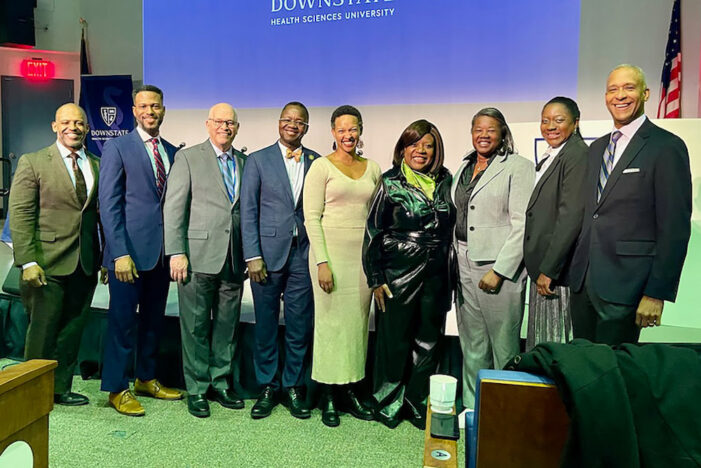| Keynote speaker Michelle Morse, M.D., MPH, Deputy Commissioner for the Center for Health Equity and Community Wellness, and the NYC Department of Health and Mental Hygiene’s inaugural Chief Medical Officer, presented, “Was the Pandemic a Portal Towards Health Justice? Progress and Backlash in Our Current Moment.” She discussed the role of political, social, and economic factors in shaping health outcomes during the pandemic.
I was delighted to provide remarks on Downstate’s dedication to enhancing lives through collaborative efforts, with a specific emphasis on the transformative potential of Artificial Intelligence in promoting health equity. Government & Community Relations Assistant Vice President Alishia Goodridge and Brooklyn Deputy Borough President Reverend Kimberly Council stressed the importance of collaboration among academia, government, and the community to address healthcare challenges and advance health equity initiatives. Their remarks highlighted the critical role that such partnerships play in driving positive change and promoting equitable healthcare outcomes.
TRANSPORT recruits and trains health equity researchers in biomedical sciences from underrepresented groups. With a recent $10M grant renewal, Downstate’s health disparities research endowment, initially established in 2017, increases to $20M, enabling Downstate to expand six existing research training programs and initiate four new initiatives focused on unraveling and addressing the pressing health disparities prevalent in Brooklyn communities.
The Brooklyn Health Disparities Center (BHDC), under the leadership of Medicine Department chair and Nephrology Division chief Moro O. Salifu, M.D., MBA, MPH, MACP, provides an academic home for TRANSPORT. Research Strategy and Operations associate vice president W. Marcus Lambert, Ph.D., provided an overview of TRANSPORT’s evolution through the BHDC, emphasizing Downstate’s role in addressing health disparities.
The second phase of TRANSPORT—TRANSPORT II—builds upon the achievements of the first phase by enhancing existing research training programs, fostering deeper collaboration with community partners in research endeavors, and actively recruiting new research scientists from underrepresented backgrounds.
Congratulations on a successful Symposium. |

